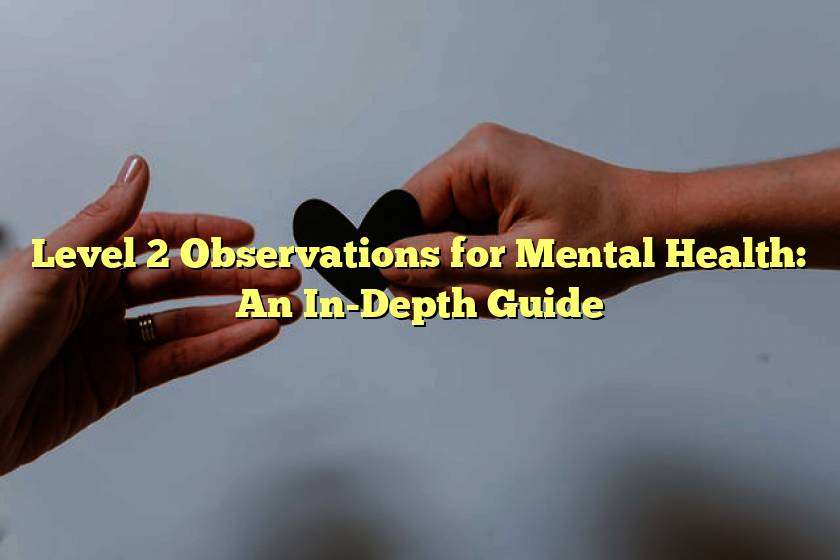Mental health is a subject that affects countless individuals on a daily basis. As such, it is crucial to pay attention to one’s mental wellbeing and take the necessary steps to remain healthy. One such way that has been deemed effective is through Level 2 observations. In this comprehensive guide, we will delve into what Level 2 observations are, why they are important, and how to implement them in one’s daily routine.
What are Level 2 Observations?
Level 2 observations are a practice that involves observing and keeping track of one’s own emotions and thoughts. This can be done either in written form or by simply reflecting on one’s thoughts and feelings. The goal of these observations is to increase one’s self-awareness and gain insight into patterns of behavior and triggers that affect one’s mental health.
Why are Level 2 Observations Important?
There are several reasons why Level 2 observations are important. Firstly, they allow individuals to gain a better understanding of their own thoughts and feelings. This increased self-awareness can help individuals recognize patterns of behavior that can negatively impact their mental health and take steps to address them.
Secondly, Level 2 observations can act as a form of self-reflection and help individuals identify triggers that may cause feelings of stress, anxiety, or depression. This can empower individuals to take proactive measures to manage their mental health and prevent negative emotions from escalating.
Lastly, Level 2 observations can provide valuable information to mental health professionals when seeking treatment. Individuals who track their emotions and thoughts may be able to communicate their experiences more effectively to their mental health provider, leading to quicker and more accurate diagnosis and treatment.
How to Implement Level 2 Observations in Your Routine
Implementing Level 2 observations in your daily routine doesn’t have to be complicated or time-consuming. Here are some simple steps to get started:
1. Choose a Method
The first step is to choose a method for recording your observations. You can either use pen and paper to journal your thoughts or use an app or digital tool to track your mood. Find a method that works for you and stick with it.
2. Set a Schedule
It’s important to set aside time each day to reflect on your thoughts and emotions. This can be done in the morning or evening, whichever works best for you. Try to stick to a set schedule to make it a consistent habit.
3. Be Honest
When recording your thoughts and feelings, it’s important to be honest with yourself. Don’t hold back or sugarcoat your emotions, as this can defeat the purpose of Level 2 observations. Write down everything that comes to mind, even if it feels uncomfortable or vulnerable.
4. Look for Patterns
As you continue to record your observations, look for patterns that emerge. Do certain thoughts or situations trigger negative emotions? Are there certain times of day when you feel more stressed or anxious? Identifying these patterns can help you take active steps to address them.
5. Take Action
Once you’ve identified patterns and triggers, take action to address them. This can involve seeking professional help, such as therapy or counseling, or making lifestyle changes to improve your mental wellbeing.
Conclusion
Mental health is a crucial aspect of overall wellbeing, and Level 2 observations can be a useful tool in maintaining good mental health. Through increased self-awareness and reflection, individuals can identify and address patterns of behavior that negatively impact their mental wellbeing. By implementing Level 2 observations in your daily routine, you can take a proactive stance towards managing your mental health and achieving a happier, healthier life.



